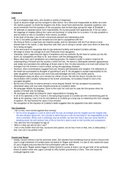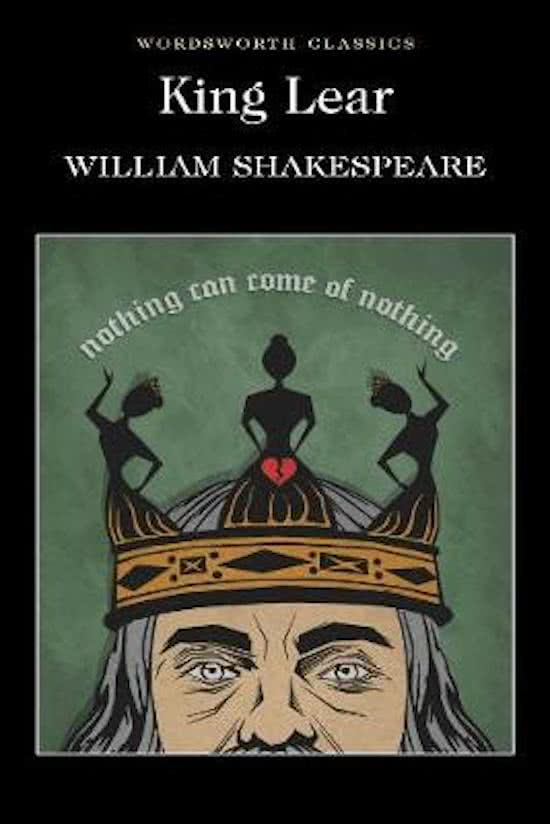Characters
Lear
- He is a complex tragic hero, who excites a variety of responses.
- Quick to abusive anger and too arrogant to take advice, he is blind and irresponsible as father and ruler.
- His ‘darker purpose’ to divide the kingdom into three, would have alarmed the Jacobean audience, who
would remember how the question of the succession had loomed large during the reign of Elizabeth I.
- He attempts to separate power from responsibility. He is preoccupied with appearances. If he can retain
the trappings of majesty without the ‘cares and business’ of ruling then he is content. It is also possible to
see his desire to rely on Cordelia’s ‘kind nursery’ as selfish.
- At the start of the play, Lear is both a tyrannical patriarch and demanding child.
- In Act II, his better qualities are revealed and we start to sympathise with him.
- His hiring of Kent is a sign that Lear inspires loyalty, and his interaction with the Fool shows a more
tolerant side to his nature. It also becomes clear that Lear is trying to remain calm even when he feels that
he is being wronged.
- In the next scene he recognises that he has behaved foolishly and treated Cordelia unkindly.
- We begin to share his outrage as G and R become more repugnant.
- Gradually, Lear’s rages become signs of impotence and not authority. By the time he rushes out into the
storm our sympathies are likely to lie, and remain, with the beleaguered king.
- Many critics see Lear’s breakdown as a learning process. He needs to suffer in order to improve his
understanding of himself and the society in which he lives. He learns to distinguish between appearances
and reality and considers the sufferings of those close to him. He also becomes a lot more self-critical. He
emerges from his torment a more humble, loving and appealing character.
- However, other commentators suggest that Lear remains self-obsessed and vengeful. His reflections on
the heath are punctuated by thoughts of punishing G and R. He struggles to accept responsibility for his
elder daughters’ cruel natures and never fully acknowledges the folly of his earlier actions.
- Shakespeare does not allow us to remain too critical of Lear. We see the king in his best list in his
reconciliation with Cordelia. Ashamed of his former unkindness, he humbles himself in front of his
youngest daughter.
- By the end of the play he seems almost to move beyond himself. He has accepted his powerless,
diminished status and now sees himself primarily as Cordelia’s father.
- His language reflects his progress. Gone is the royal ‘we’ and now he uses the first person when he
speaks of himself and his feelings.
- He revenges her death by killing the ‘slave’ responsible for hanging her.
- In all of his speeches in Act V scene 3, the dying king focuses on Cordelia and the overwhelming grief he
feels at her passing. Lear’s love for and defence of Cordelia go a long way to redeeming him from charges
of egotism. He has learned the value of true emotion.
- His recognition of the injustice of Cordelia’s death suggests that his judgement has been restored.
Key Quotations
- “I am a man, more sinned against than sinning”
• As his mind struggles to come to terms with his loss of privilege and the insights and the insights that
his new situation gives him, he is forced to admit that as a ruler he has failed in his responsibility to the
most vulnerable. While Lear’s sufferings may be terrible, we see here that it also has some benefit in
breaking down his self-centred view of life so that he is able to start to feel humility and compassion.
- “You see how full of changes his age is”
- “Who is it that can tell me who I am?”
- “I am a very foolish fond old man, fourscore and upward, not an hour more or less, and, to deal plainly, I
fear I am not in my perfect mind”
Goneril and Regan
- Initially, Goneril seems to be the dominant sister. She decides that something must be done to ensure that
Lear’s rough treatment of Cordelia does not extend to Regan and herself, it is also G who raises the issue
of Lear’s knights and provokes the first confrontation with her father.
- Up to this point, Regan seems happy to follow Goneril’s course of action, but we get hints of her particular
brand of sadism when she urges Cornwall to inflict further punishment on Kent. Then she leads the
onslaught against Lear.
, - Both participate in what is for many the most horrific scene in the play, the blinding of Gloucester. Goneril
suggests the method of torture and then Regan assaults Gloucester, tearing a hair from his beard, and
egging her husband on to further cruelty.
- They can be seen as subversive figures who share many character traits. Both are threatening and
autocratic, cold and ambitious. Both lust after Edmund in a predatory and unfeminine way.
- They are masculine in other ways too. Goneril denies Albany’s authority as well as traditional morality,
arrogantly asserting her own power when she says “the laws are mine, not thine”.
- Regan may not be an adulteress, but she is a murderess. She does ‘man’s work’ when she runs the
servant through wth a sword in Act III scene 7.
- G and R’s vindictive assertiveness would have been particularity shocking to a Jacobean audience.
Renaissance models of felinity requires women to be quiet and submissive. Among Lear’s highest praise
for Cordelia is that her voice was ‘soft’, but his elder daughters subvert all the accepted codes of feminine
behaviour.
- The terror the sisters inspire is emphasised by the animal imagery in the play and by the abhorrence of
female sexuality exhibited, especially by Lear.
- It could be possible to create a feminist defence of G and R. We might recognise the validity of their
complaints about Lear, we might sympathise with them because they are not Lear’s favourites and we
might reflect that they have been constrained by limiting ideas about womanhood and in reaction assert
themselves with courage and ambition.
- The best that can be said for them is that they are energetic in their pursuit of self-gratification.
Key Quotations
- Upon discovering Albany’s reluctance to fight against Lear and Cordelia, and his horror at the way
Gloucester has been treated, Goneril tells Edmund “I must change arms at home, and give the distaff into
my husband’s hands”
• Goneril is not only rejecting the role of obedient wife, but is seeking to reverse normal gender
expectations. Her husband is fit only for domestic duties, symbolised by the ‘distaff’ (a stick used for the
spinning of wool). She will ‘change arms’ and take on his position as a military leader. In a different
version it reads “change names” which means that Albany will be known as the wife and she as the
husband. Regan is happier with her husband Cornwall, whose ambition and viciously violent temper
clearly suit her outlook, but after his death, she is able to pursue Edmund too.
- “I shall never marry like my sisters, to love my father all”
- “Pray you, let us hit together”
- “How sharper than a serpent’s tooth it is, to have a thankless child!”
- “Unnatural hags”
- “Tigers, not daughters”
- “Each jealous of the other, as the stung are of the adder”
Cordelia
- Lear’s favourite daughter is possibly more problematic for audiences today than she would have been for
the Jacobeans. She can seem infuriatingly pious.
- Some critics interpret her refusal to speak flattering words to Lear and her acceptance of France as acts of
defiance; she is in direct conflict with patriarchy on both occasions, refusing to submit to her father’s will. If
we follow these arguments through, it is possible to interpret Cordelia’s death as a reward for her early
disobedience.
- In Act I scene 1, she is seeking to alert Lear of his poor judgment. Her refusal to participate in a glib public-
speaking contest can be seen as a sign of her integrity. As the play progresses we learn to distrust all the
characters who have an easy way with words.
- When she returns in Act IV she is nothing but subversive. We are presented with a perfect daughter who
will act as redeemer.
- Cordelia’s death has troubled critics and audiences since the play was first performed, and various
explanations have been put forward as to why it occurs.
- It can be argued that an ending in which Britain was taken over by the wife of the French King would have
offended the patriotic feelings of Shakespeare’s audience and also suggested to the worrying possibilities
of future conflict.
- However, Shakespeare needs a final cruel blow to bring about Lear’s death, so perhaps her death is an
expression of this tragic vision.
- It might also be a final example of man’s inhumanity to man in the world of King Lear. Shakespeare
perhaps wants to show the full horror of the consequences of Lear’s folly.





